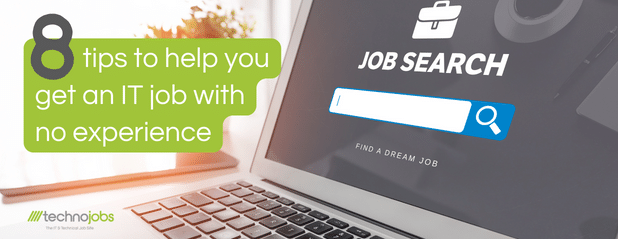8 tips to help you get an IT job with no experience

The IT and tech industry is one of the fastest growing industries in the world, not only does it offer job variation, but it offers job stability, high salaries, career progression, and remote and flexible working opportunities. Therefore, it has become a popular industry to consider getting into.
The thought of changing career paths can be daunting especially if you are already in a senior role in another industry, however, it can be simpler than you think. We’ve put together 8 tips to help you get an IT job with no experience.
1. Review your existing skills
Whilst you may not have the relevant technical skills for some IT and tech jobs, you most likely have some transferable soft skills that employers will value. For example, if you have strong problem-solving skills and communication skills, you could consider a career in IT support, where customers and colleagues will come to you with troubleshooting issues. Or if you consider creativity one of your strengths, you might look into Web Designer roles or User Experience roles.
2. Look into industry certifications
You may not have a degree in computer science or software engineering but having a tech-related degree is no longer a requirement for many IT jobs. There are now a number of industry-specific courses you can take, that will cost you less money and save you time. For example:
- For a career in cyber security, you can take the Certified Information Systems Security Professional (CISSP) certification.
- For a career in project management, you can take certifications with the Project Management Institute (PMI) which are recognised globally.
- For a career in IT Support, many Microsoft certifications are based on industry standards.
3. Be prepared to go into an entry-level job
With a career switch, you have to be prepared to start from the bottom. You may have previously come from an executive or managerial role, but you would have worked your way up to this title. Starting at the bottom will mean you can gain the essential industry skills and experience to help you progress your career. There are many entry-level jobs in the tech industry that come with excellent progression opportunities.
4. Networking is key
Networking is an opportunity to meet new people in different industries. Often at networking events, everyone is there for the same reason, to share their knowledge, increase their connections and raise their profile. If you are new to the IT and tech industry, attending events will help you build relationships that could lead to career opportunities. It may also help you figure out what areas of IT you are interested in, giving you a clearer idea of your career path.
5. Be open to learning new skills
Whilst some of your existing skills may be transferable, there will always be more you can learn to help you become more employable. Tech skills are some of the most in-demand at the moment, as the majority of jobs now involve using different tools and applications to help make work easier.
6. Industry crossovers
If you’re swapping careers, it can often make things easier to move into an industry you’ve worked in before. For example, if you previously worked in sales within the healthcare industry, you could move into a more technical role such as a Business Analyst or Systems Administrator in healthcare, as you will already have industry experience. You will just need to work on developing the required skills.
7. Tailor your CV
Writing a CV is the most important part of job hunting as it will secure you interviews. Whenever you apply for a job, you should always tailor your CV to suit the job for which you are applying. Depending on what skills are listed in the job description you should write your CV in a way that demonstrates those specific skills and responsibilities.
8. Prepare for your interview
Preparation is always key when it comes to acing an interview. However, if you are switching careers and you have no experience to discuss that it might be difficult to know where to start. Typically, many of the questions are asking more about your competency rather than your skill set, especially if you are going for an entry-level position, then the employer wants to know that you have the right mindset for the tasks in the role. As well as being able to give examples of your transferable skills, it is also a good idea to look up industry trends, as your potential employer will want to know you are proactively learning and keeping up to date with the latest developments in technology. Find our most common IT Job interview questions here.
The demand for UK tech talent is growing rapidly with over 2 million vacancies for tech roles in the last year. Development in technologies means more tech and IT roles are created every day, and therefore now is the time to consider switching to a career in tech, even if you don’t have years of experience, there are still a variety of entry-level jobs you can get into that has great career progression.




